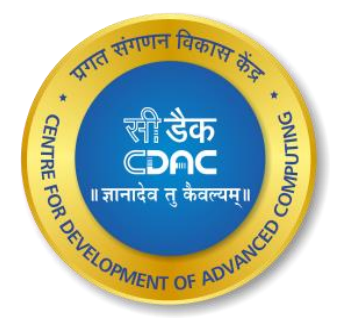
Department of Computer Science and Engineering(AI & ML)
- ABOUT
- INFRASTRUCTURE
- STUDENT LEARNING CENTRIC
- FACULTY PROFILES
- ACHIEVEMENTS
- INDUSTRY INTERFACE
- PLACEMENTS
- CO-CURRICULAR & EXTRA CURRICULAR ACTIVITIES
- MENTORING MODULE
- E - NEWSLETTER
- COE-CSE (AI & ML)
About the Department
The Department of Computer Science and Engineering (Artificial Intelligence & Machine Learning) was established in 2022-2023 with an initial intake of 60 students. The department is dedicated to nurturing future-ready AI & ML professionals by providing a strong foundation in artificial intelligence, machine learning, and emerging technologies.
With a well-structured curriculum and state-of-the-art infrastructure, the department equips students with practical skills and industry-relevant knowledge to excel in the evolving job market. Our highly motivated faculty members focus on innovative teaching methodologies, fostering a research-driven learning environment that encourages experimentation, creativity, and problem-solving.
The department consistently strives to meet industry demands by producing skilled AI & ML engineers capable of tackling real-world challenges. Through collaborations, hands-on projects, and a strong academic framework, we aim to establish a centre of excellence in education and research, transforming students into competent professionals and responsible citizens.
Message from the Desk
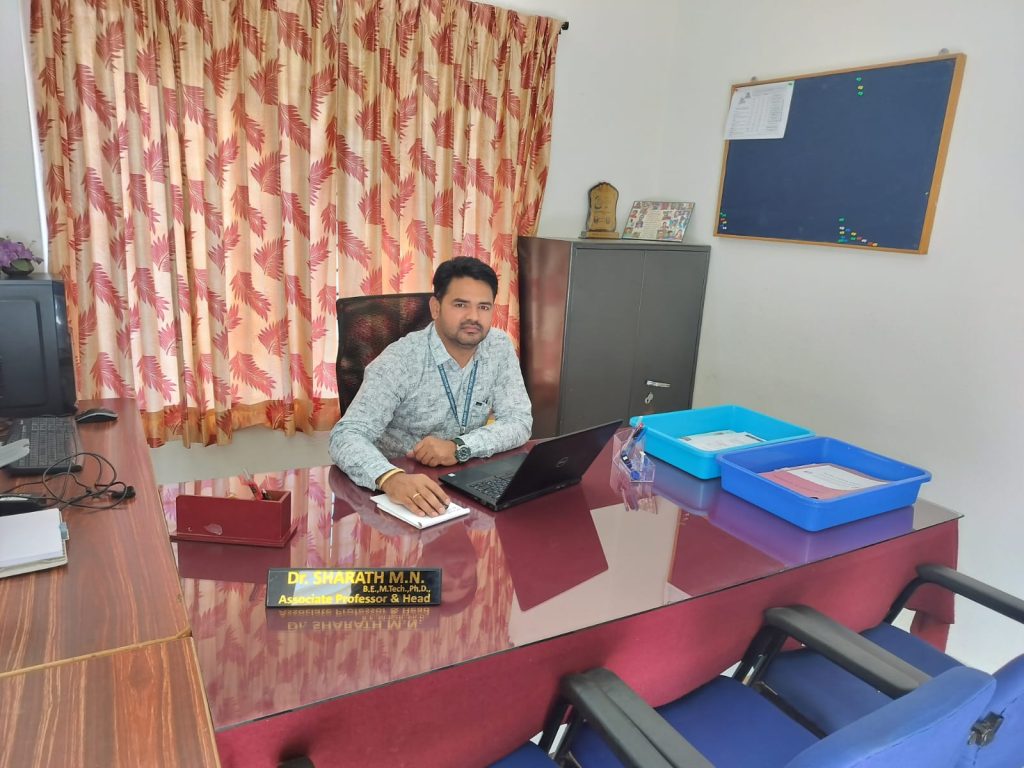
Dr. Sharath M N
Head of the Department
Dear Students, Faculty, and Colleagues,
“Welcome to the Department of Computer Science and Engineering (AI & ML). It is my privilege to serve as the Head of this dynamic program. Our department fosters innovation, shaping the next generation of AI & ML pioneers. We offer a curriculum that blends strong theoretical foundations with hands-on experience. With state-of-the-art labs and cutting-edge research, we empower students to tackle real-world challenges. Collaboration with industry and academia enhances learning and innovation. Our inclusive environment encourages research, creativity, and problem-solving. I invite you to explore our programs and be part of this transformative journey. Join us in shaping the future of AI & ML!”
Best regards,
Dr. Sharath M N
Head of the Department, CSE(AI&ML)
Vision of the Department
To be a renowned department for education, training, and research in the frontline areas of Artificial Intelligence and Machine Learning by creating professionals to deal with real-world challenges.
Mission of the Department
M1: To render quality education in the areas of Artificial Intelligence and Machine Learning through the best teaching-learning processes to enable students for careers, higher education, and research.
M2: To develop professionals with social concern and professional ethics.
Program Educational Objective’s (PEO’s)
PEO1: Graduates of the program will have the ability to understand, analyse, and design Artificial Intelligence and Machine Learning solutions to real-world challenges.
PEO2: Graduates of this program will have the ability to get employed and excel in their professional careers and research to achieve higher goals.
PEO3: Graduates of the program will excel as socially committed engineers with high ethical and moral values.
Program Outcomes
Engineering Graduates will be able to:
- Engineering knowledge: Apply the knowledge of mathematics, science, engineering fundamentals, and an engineering specialization to the solution of complex engineering problems.
- Problem analysis: Identify, formulate, review research literature, and analyse complex engineering problems reaching substantiated conclusions using first principles of mathematics, natural sciences, and engineering sciences.
- Design/development of solutions: Design solutions for complex engineering problems and design system components or processes that meet the specified needs with appropriate consideration for the public health and safety, and the cultural, societal, and environmental considerations.
- Conduct investigations of complex problems: Use research-based knowledge and research methods including design of experiments, analysis and interpretation of data, and synthesis of the information to provide valid conclusions.
- Modern tool usage: Create, select, and apply appropriate techniques, resources, and modern engineering and IT tools including prediction and modelling to complex engineering activities with an understanding of the limitations.
- The engineer and society: Apply reasoning informed by the contextual knowledge to assess societal, health, safety, legal and cultural issues and the consequent responsibilities relevant to the professional engineering practice.
- Environment and sustainability: Understand the impact of the professional engineering solutions in societal and environmental contexts, and demonstrate the knowledge of, and need for sustainable development.
- Ethics: Apply ethical principles and commit to professional ethics and responsibilities and norms of the engineering practice.
- Individual and team work: Function effectively as an individual, and as a member or leader in diverse teams, and in multidisciplinary settings.
- Communication: Communicate effectively on complex engineering activities with the engineering community and with society at large, such as, being able to comprehend and write effective reports and design documentation, make effective presentations, and give and receive clear instructions.
- Project management and finance: Demonstrate knowledge and understanding of the engineering and management principles and apply these to one’s own work, as a member and leader in a team, to manage projects and in multidisciplinary environments.
- Life-long learning: Recognize the need for, and have the preparation and ability to engage in independent and life-long learning in the broadest context of technological change.
Program Specific Outcomes
PSO1: An ability to apply concepts of Artificial Intelligence and Machine Learning to design, develop, and implement solutions to solve technical problems.
PSO2: An ability to use Artificial Intelligence and Machine Learning knowledge for a successful career as an employee and an engineering professional.
Short term Goals
- Enhanced Curriculum: Continuously update and enhance the curriculum to include the latest trends and advancements in AI and ML technologies.
- Research Initiatives: Increase the number of research projects and collaborations with industry partners to solve real-world problems using AI and ML.
- Skill Development: Offer workshops, seminars, and training sessions to develop practical skills and hands-on experience in AI and ML for students and faculty.
- Industry Partnerships: Establish new partnerships with leading tech companies to provide internship and job opportunities for students.
- Student Competitions: Encourage and support students to participate in national and international AI and ML competitions and hackathons.
Long term Goals
- Centre of Excellence: Establish the department as a centre of excellence in AI and ML research and education, recognized both nationally and internationally.
- Innovative Research: Foster ground-breaking research that leads to significant advancements in AI and ML, contributing to academic and industrial innovation.
- Global Collaborations: Build global partnerships with top universities and research institutions to collaborate on cutting-edge AI and ML projects.
- Alumni Network: Develop a strong alumni network that actively contributes to the department’s growth through mentorship, funding, and collaboration.
- Social Impact: Leverage AI and ML technologies to address and solve critical societal issues, such as healthcare, education, and environmental sustainability.
Class In-Charge Details
Sl. No. | Year | Faculty Name | Faculty Email-ID |
| 1 | 2nd Year | Ms. Chithra H N | chithrahn@rithassan.ac.in |
| 2 | 3rd Year | Mr. Lohith D K | lohith.dk.3@rithassan.ac.in |
| 3 | 4th Year | Mrs. Kannika Lakshmi D G | kannika.dg@rithasaan.ac.in |
Infrastructure
The CSE (AI & ML) Department is equipped with state-of-the-art infrastructure to support academic excellence and research. Our department features well-furnished classrooms, modern computer labs with high-performance systems, and dedicated project spaces to foster innovation. The department also offers a digital library, seminar hall, and collaborative learning zones to enhance student engagement. Each lab is equipped with the latest software tools to meet industry standards. The infrastructure is designed to provide students with a conducive environment for both theoretical learning and hands-on practice.
Laboratory Details
Computer Networks Laboratory
The Computer Networks Lab is equipped with advanced networking devices, simulation tools, and high-speed internet to provide hands-on learning experiences. Students gain practical knowledge in network design, configuration, and troubleshooting using industry-standard tools. The lab supports experiments on protocols, routing algorithms, and real-time network simulations. This facility enables students to develop essential networking skills required for their professional growth.
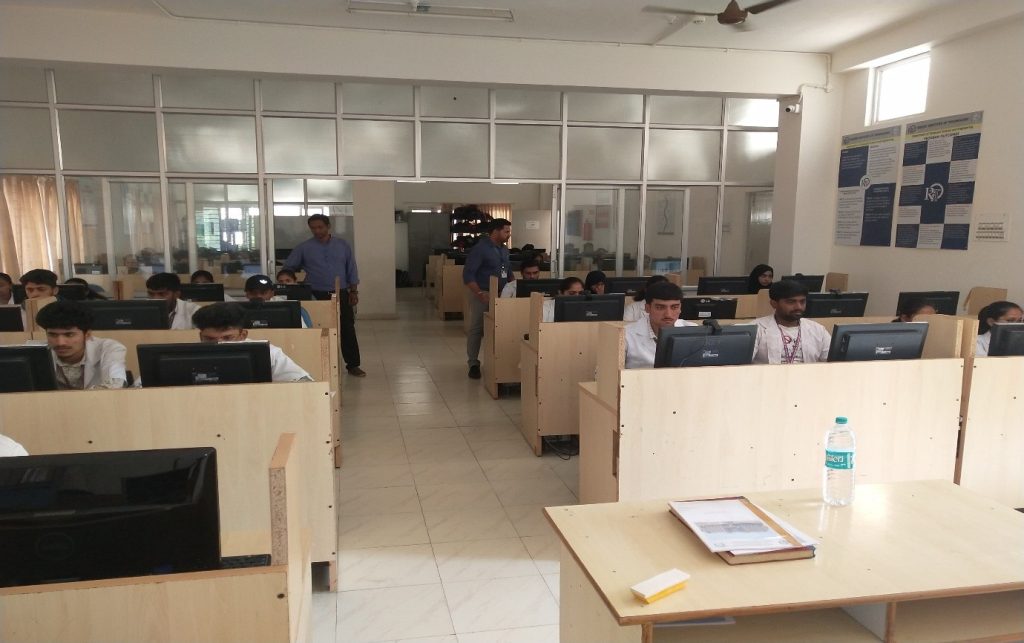
Database Applications Laboratory
The Database Lab is equipped with modern computing systems and advanced database management tools to facilitate hands-on learning. Students gain practical experience in database design, query optimization, and data manipulation using platforms like MySQL, Oracle, and MongoDB. The lab supports projects involving real-time data processing and application development. This environment empowers students to build strong database skills essential for industry readiness.

AI & ML Laboratory
The AI & ML Lab is equipped with high-performance computing systems and essential software tools like Python, TensorFlow, and PyTorch. It provides a dedicated environment for students to explore machine learning algorithms, data analytics, and artificial intelligence models. The lab supports hands-on projects in areas such as computer vision, natural language processing, and predictive analytics. This facility empowers students to build intelligent solutions for real-world challenges.

Data Structures & Applications Laboratory
The Data Structures Lab is designed to help students understand core programming concepts and algorithm design. Equipped with modern computing systems and essential programming tools, the lab enables students to implement and analyse data structures such as arrays, linked lists, stacks, queues, and trees. Hands-on experiments in the lab enhance problem-solving skills and strengthen the foundation for advanced computing concepts. This facility plays a vital role in developing students’ coding proficiency and logical thinking abilities.
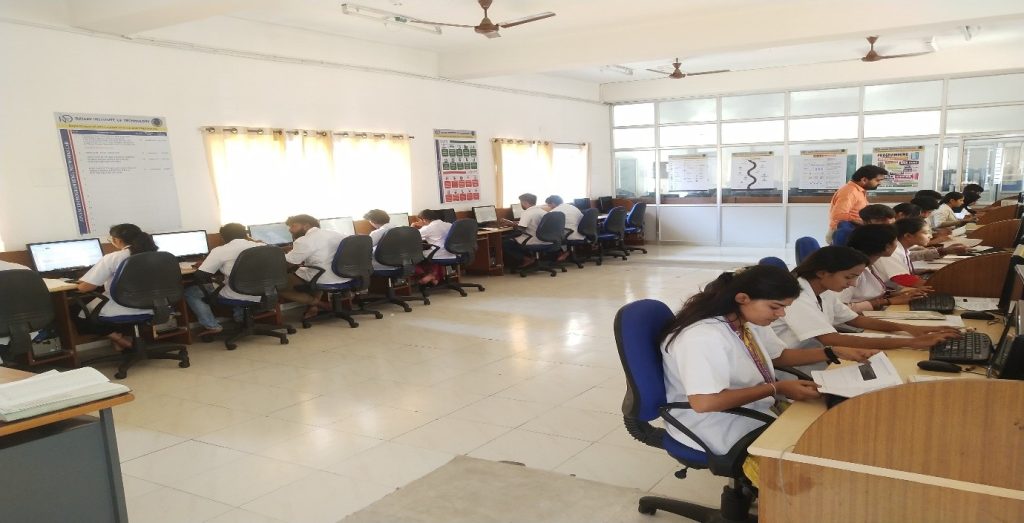
Analysis & Design of Algorithms Laboratory
The ADA Lab is equipped with advanced computing resources to help students understand algorithm design, analysis, and optimization techniques. Students gain practical experience in implementing efficient algorithms for sorting, searching, graph theory, and dynamic programming. The lab focuses on improving problem-solving skills by applying theoretical concepts to real-world challenges. This environment enables students to develop strong analytical and coding abilities essential for competitive programming and software development.
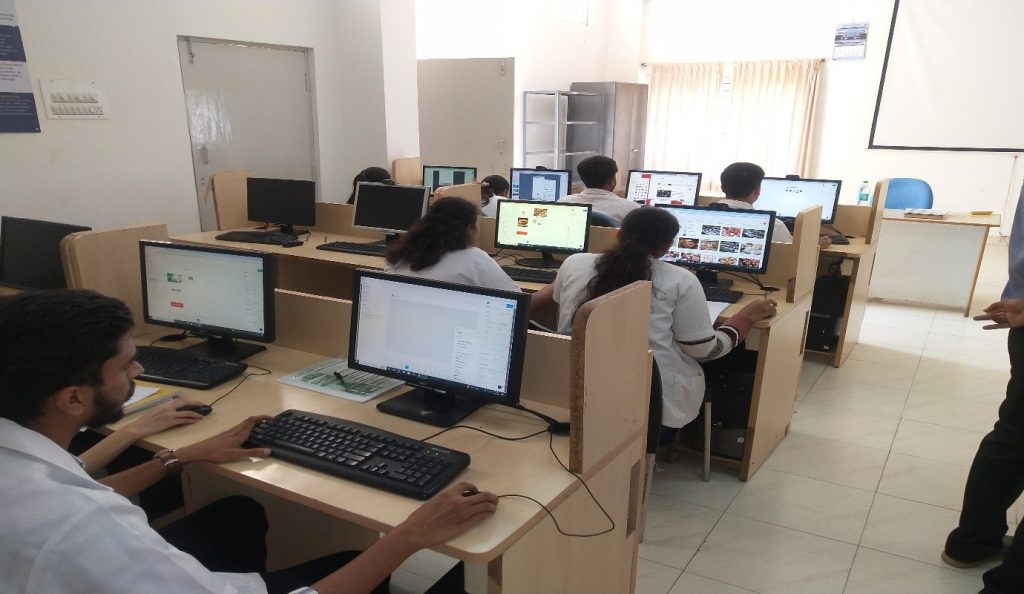
Computer Science and Engineering(AI&ML) |
||||||||
Student Learning Centric Details(2025-2026)(Odd Semester) |
||||||||
|
SL.No. |
Subject Code | Faculty Name | Course Modules | Lesson plan | Notes of lessons | PPT | Lab Manual |
Lab Videos |
| 1 | BCS501 | Dr.Prabhakara H S | Link | Link | Link | Link | ||
| 2 | BCS502 | Mr.Lohith D K | Link | Link | Link | Link | Link | Link |
| 3 | BCS503 | Mrs.Kannika Lakshmi D G | Link | Link | Link | |||
| 4 | BAIL504 | Dr.Sharath M N | Link | Link | ||||
| 5 | BCS515C | Ms.Chithra H N | Link | Link | Link | Link | ||
| 6 | BRMK557 | Mrs.Mamatha M | Link | Link | Link | Link | ||
| 7 | BCS508 | Mr.Manjunath H S | Link | Link | Link | NA | NA | |
Computer Science and Engineering(AI&ML) |
||||||
Student Learning Centric Details(2024-2025)(4th Semester) |
||||||
| Subject Code | Faculty Name | Course Modules | Lesson plan | Notes of lessons | Lab Manual | Lab Videos |
| BCS401 | Ms.Sindhu Jain A M | Link | Link | Link | – | – |
| BAD402 | Mrs.Pooja T K | Link | Link | Link | Link | Link |
| BCS403 | Dr.Prabhakara H S | Link | Link | Link | Link | Link |
| BCSL404 | Mr.Lohith D K | Link | Link | – | Link | Link |
| BCS405A | Ms.Chandana B Y | Link | Link | Link | – | – |
| BCS4L56D | Mr.Lohith D K | Link | Link | – | Link | Link |
| BBOC407 | Mrs.Kannika Lakshmi D G | Link | Link | Link | – | – |
| BUHK408 | Mrs.Nalini H C | Link | Link | Link | – | – |
6th Semester
| Subject Code | Faculty Name | Course Modules | Lesson plan | Notes of lessons | PPT | Lab Manual | Lab Videos |
| BC0601 | Mrs.Sahana R S | Link | Link | Link | Link | Link | Link |
| BCS602 | Mr.Sanjay M | Link | Link | Link | Link | Link | Link |
| BIS613D | Mrs.Pooja T K | Link | Link | Link | Link | Link | Link |
| BCV654A | Mr. Manjunatha K H | Link | Link | Link | Link | Link | Link |
| BCSL606 | Mr.Sanjay M | Link | Link | Link | Link | Link | Link |
| BADL657B | Dr.Sharath M N | Link | Link | Link | Link | Link | Link |
ACHIEVEMENTS
Faculty Achievements
FACULTY ACHIEVEMENTS
Faculties with PHD
Sl. No. | Faculty Name | University | Year of Completion |
| 1 | Dr. Prabhakara H S | University of Mysore | 2014 |
| 2 | Dr. Sharath M N | Dayananda Sagar University | 2023 |
BOOKS PUBLISHED
| Sl. No. | Year | Title of the Book | Author | Publisher | ISBN |
| 1 | 2024 | Advanced JAVA Programming | Dr. Sharath M N | Pandit Publications | 978-93-93769-91-6 |
| 2 | 2024 | Object Oriented Programming with Java Laboratory Manual | Dr. Sharath M N | Iterative international publisher | 978-93-6252-086-9 |
| 3 | 2024 | A Robust Model for Securing the Data in Video Communication | Dr. Sharath M N | i-libra publications | 978-81-973302-8-5 |
NPTEL Online Certifications
Sl. No. | Faculty Name | Course Title | Course Duration | Year |
| 1. | Dr. Sharath M N | OBE and Accreditation | 12 Week Course | Jul-Oct 2025 |
| 2. | Mr. Lohith D K | Cloud Computing | 12 Week Course | Jul-Oct 2025 |
| 3. | Ms. Chithra H N | Introduction to Machine Learning | 12 Week Course | Jul-Oct 2025 |
| 4. | Mr. Lohith D K | Ethical Hacking | 12 Week Course | Jul-Oct 2025 |
| 5. | Dr. Sharath M N | Accreditation and Outcome Based Learning | 8 Week Course | Aug-Oct 2025 |
| 6. | Dr. Sharath M N | Introduction to Programming in C | 8 Week Course | Jul-Sep 2025 |
| 7. | Mr. Lohith D K | Computer Graphics | 8 Week Course | Jul-Sep 2025 |
| 8. | Dr. Sharath M N | Programming in Java | 12 Week Course | Jan-Apr 2025 |
| 9. | Dr. Sharath M N | Problem Solving Through Programming In C | 12 Week Course | Jan-Apr 2025 |
| 10. | Mr. Lohith D K | Fundamentals of Object-Oriented Programming | 12 Week Course | Jan-Apr 2025 |
| 11. | Mr. Lohith D K | Cloud Computing and Distributed Systems | 8 Week Course | Jan-Mar 2025 |
| 12. | Mr. Lohith D K | Big Data computing | 8 Week Course | Aug-Oct 2024 |
| 13. | Mr. Lohith D K | Data Science for Engineers | 8 Week Course | Jul-Sep 2024 |
| 14. | Mr. Lohith D K | Data Base Management System | 8 Week Course | Jan-Mar 2024 |
| 15. | Mrs. Pooja T K | Data Base Management System | 8 Week Course | Jan-Mar 2024 |
| 16. | Mr. Lohith D K | Distributed Systems | 8 Week Course | Jul-Sep 2023 |
| 17. | Mrs. Pooja T K | Distributed Systems | 8 Week Course | Jul-Sep 2023 |
Number of Quality Publication from the Department
Faculty Publication Details | |
| International Journals | 17 |
| International Conferences | 31 |
| Books Published | 3 |
| Patents | 7 |
Students Achievements
STUDENTS ACHIEVEMENTS
NPTEL Online Certifications
Sl. No. | Student Name | Course Title | Course Duration | Year |
| 1 | Mr. Madan B | Problem Solving Through Programming in C | 12 Week Course | Jul-Oct-2024 |
| 2 | Ms. Ameena Kouser | Programming in Java | 12 Week Course | Jul-Oct-2024 |
| 3 | Ms. Inchana K V | Programming in Java | 12 Week Course | Jul-Oct-2024 |
Activities Conducted during ODD sem 2025-2026
Sl. No. | Activity Name | Targeted Students | Date |
| 1 | Workshop on “Data Visualization and Business Intelligence” | 5th Sem -CSE(AI&ML) | 12-08-2025 to 14-08-2025 |
| 2 | Industrial Visit – KMF, Hassan | 5th Sem -CSE(AI&ML) | 02-09-2025 |
| 3 | Poster Designing | RIT Students | 10-09-2025 |
| 4 | Syntaxia | RIT Students | 12-09-2025 |
| 5 | GameForge | RIT Students | 17-09-2025 |
| 6 | Workshop on “Campus to Corporate” | 3rd Sem-CSE(AI&ML) | 29-09-2025 |
| 7 | Ayudha Pooja | RIT Students | 30-09-2025 |
| 8 | Byte and Bite Walk | 3rd Sem-CSE(AI&ML) | 10-10-2025 |
| 9 | Parents Teachers Meeting | 5th Sem -CSE(AI&ML) | 31-10-2025 |
| 10 | Tree Plantation | 3rd Sem-CSE(AI&ML) | 14-11-2025 |
| 11 | Heritage Walk | 3rd Sem-CSE(AI&ML) | 15-11-2025 |
| 12 | Senior Junior Confluence | 3rd Sem-CSE(AI&ML) | 28-11-2025 |
Activities Conducted during EVEN sem 2024-2025
Sl. No. | Activity Name | Targeted Students | Date |
| 1 | WEB UI Workshop | 6th sem | 20-02-2025 to 22-02-2025 |
| 2 | Invited Talk on E-Waste | 4th & 6th sem | 24-02-2025 |
| 3 | Invited Talk on IKS | 4th & 6th sem | 07-03-2025 |
| 4 | AI Quiz Competition | 4th & 6th sem | 12-03-2025 |
| 5 | UI-NITE | RIT Students | 23-04-2025 |
| 6 | Significance of IP Protection and Commercialization | 4th & 6th sem | 25-04-2025 |
Activities Conducted in AY 2024-2025 ODD Semester
SL No. | Activity | Targeted Audience | No. of Students | Date |
| 1 | Activity on “Plantation and Adoption” | 3rd sem students | 56 | 21-10-2024 |
| 2 | AVINYA Club Inauguration | 3rd and 5th sem students | 121 | 30-10-2024 |
| 3 | Let’s Debate “Clash on AI” | RIT students | 20 | 30-10-2024 |
| 4 | Technical Talk | 3rd sem students | 56 | 04-11-2024 |
| 5 | Activity on “Water Conservation” | 3rd sem students | 56 | 05-11-2024 |
| 6 | Activity on “Heritage Walk and Craft Corner” | 3rd sem students | 56 | 05-11-2024 |
| 7 | Industrial Visit | 5th sem students | 65 | 07-11-2024 |
| 8 | Historical Visit | 5th sem students | 65 | 07-11-2024 |
| 9 | Technical Talk | 5th sem students | 65 | 11-11-2024 |
| 10 | Activity on “Food Walk” | 3rd sem students | 56 | 23-11-2024 |
| 11 | Activity on “Organic Farming and Waste Management” | 3rd sem students | 56 | 02-12-2024 |
| 12 | Bootcamp on “Demystifying Android App Security” | 5th sem students | 54 | 02-12-2024 to 06-12-2024 |
| 13 | PrepInsta – Online Courses | 5th sem students | 47 |
Student Mentoring Module
The CSE (AI & ML) Department follows a structured Student Mentoring Module to provide continuous support and guidance to students throughout the semester. The module aims to identify student learning patterns and improve their academic performance through personalized mentoring sessions.
Mentoring Framework
- Mentor-Student Ratio: Each mentor will be assigned a maximum of 25 students.
- Frequency of Mentoring: Each mentor will conduct minimum 3 mentoring sessions per semester.
- Classification of Students: Based on previous academic performance, students will be categorized into:
- Fast Learners
- Average Learners
- Slow Learners
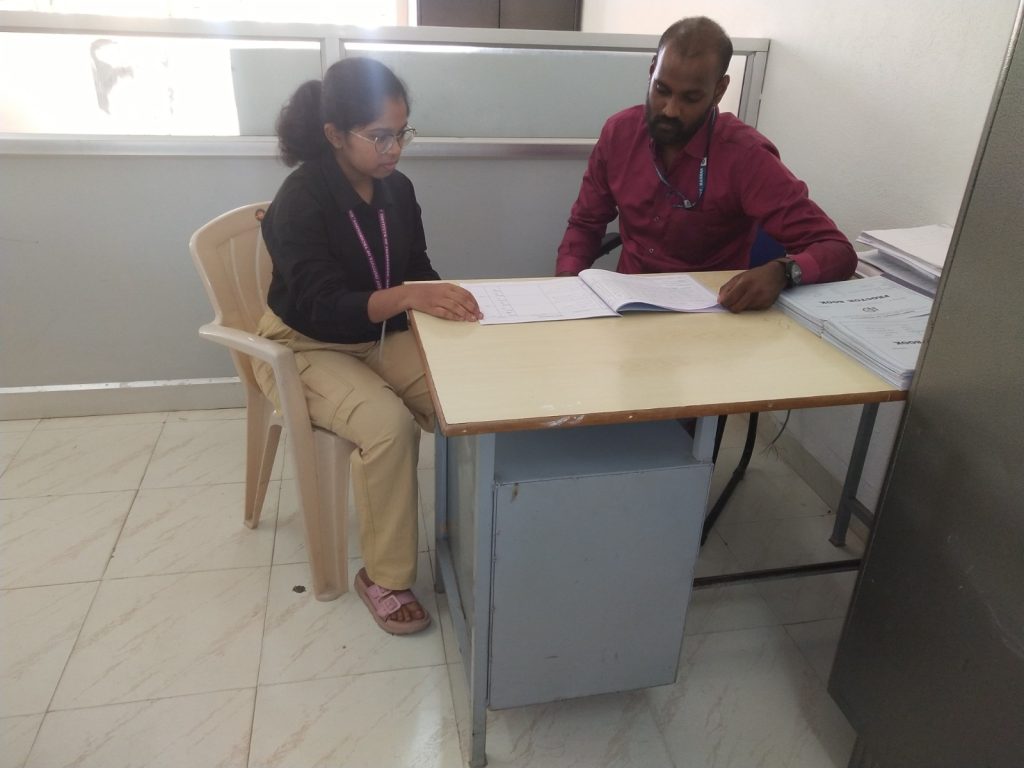
Mentoring Process
- The department conducts 3 Internal Assessments (IA) during each semester.
- After each IA, mentors will analyse student performance to:
- Identify learning gaps
- Provide targeted support to slow learners
- Encourage and challenge fast learners with advanced learning activities
- Offer guidance to average learners for consistent improvement
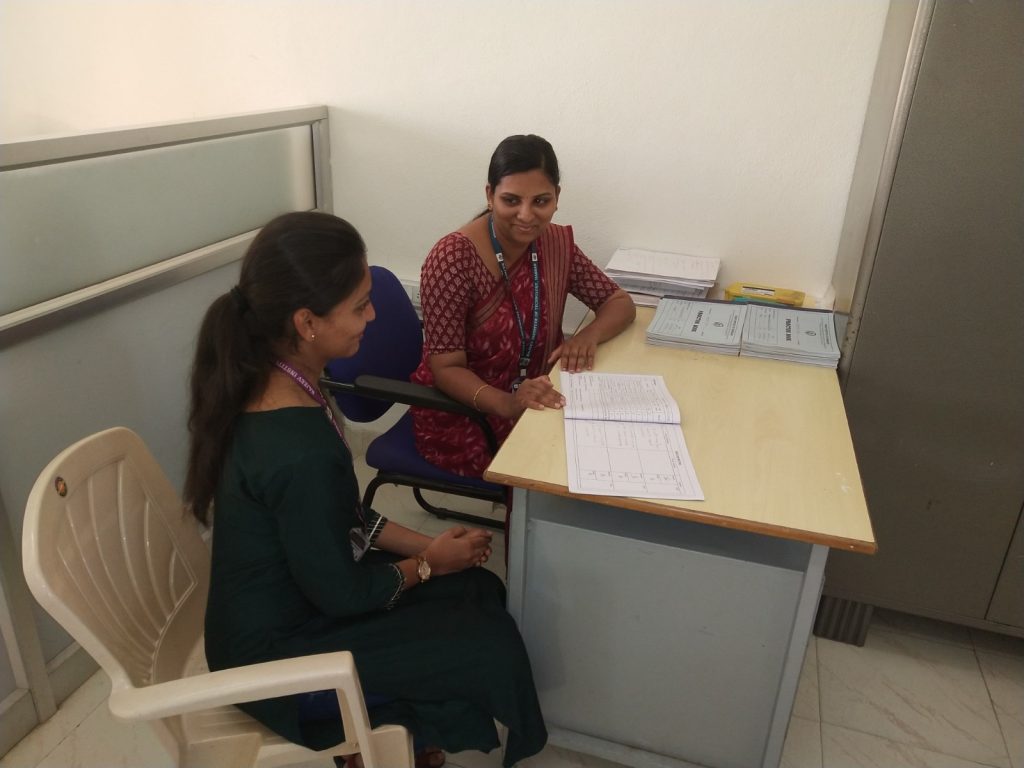
Objectives
The mentoring system ensures:
- Personalized attention to students’ academic progress
- Timely intervention for students needing additional support
- Motivation and resource guidance for fast learners to excel further
Outcome
This structured mentoring system helps in improving overall student performance, fostering a positive learning environment, and enhancing the academic standards of the department.
Yearwise E – Newsletters















